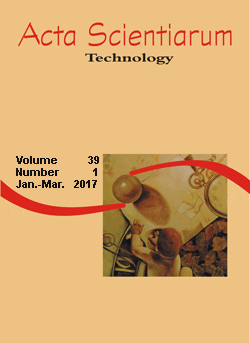<b>Estimation of tracked vehicle suspension parameters
DOI:
https://doi.org/10.4025/actascitechnol.v39i1.29385Keywords:
vehicle suspension, inverse problem, R2W, PSO.Abstract
This work aims to estimate the suspension stiffness and damping coefficient of a tracked vehicle by using an inverse problem technique based on Particle Swarm Optimization (PSO) and on Random Restricted Window (R2W). The tracked vehicle has ten road wheels. Each road wheel is linked to a passive and independent suspension. A half car model with seven degrees of freedom describes the bounce and pitch dynamics of the chassis and the vertical dynamics of the wheels. Bounce and pitch accelerations are evaluated when the vehicle traverses a bump terrain. The inverse problem approach minimizes the total quadratic error between estimated and pseudo-experimental data for bounce and pitch accelerations. The viability of a field experiment to estimate the suspension parameters is analyzed, as well as the performance of the employed optimization methods and the effects of the noise on pseudo-experimental data.
Â
Downloads
Downloads
Published
How to Cite
Issue
Section
License
DECLARATION OF ORIGINALITY AND COPYRIGHTS
I Declare that current article is original and has not been submitted for publication, in part or in whole, to any other national or international journal.
The copyrights belong exclusively to the authors. Published content is licensed under Creative Commons Attribution 4.0 (CC BY 4.0) guidelines, which allows sharing (copy and distribution of the material in any medium or format) and adaptation (remix, transform, and build upon the material) for any purpose, even commercially, under the terms of attribution.
Read this link for further information on how to use CC BY 4.0 properly.















8.png)




